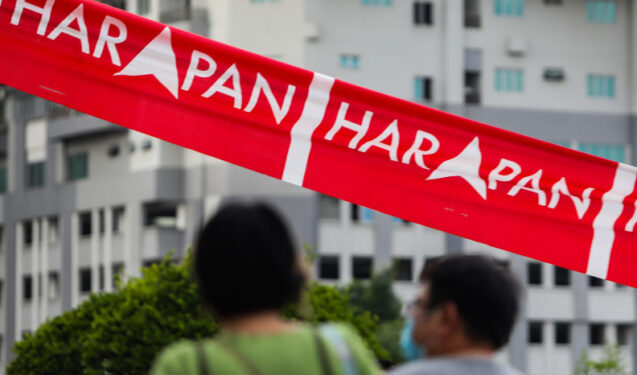By Amanda Yeo
ALTHOUGH there is a smooth transition of power to the new administrations in both the US and Malaysia, the anti-Asian sentiments in the US, and Malaysia’s ongoing political dilemma between Umno and Bersatu are a troubling factor in both nations.
Many citizens expressed concern as the rise of identity politics eventually would halt the development progress in both countries.
In short, identity politics refers to groups of people having a particular racial, religious, ethnic, social or cultural identity that tend to promote their own specific interests or concerns without regard to the interests or concerns of any larger political group.
As politics today is defined less by economic equality than by questions of identity, a rapid globalisation only results in even more polarised democratic societies.
According to the Economist Intelligence Unit’s recent findings on Democracy Index 2020, only about half (49.4%) of the world’s population live in a democracy of some sort, and even fewer (8.4%) reside in a “full democracy”.
The ongoing struggle brought about by the rising cost of living and stagnant income has resulted in an increasing public dissatisfaction, particularly among the marginalised groups such as ethnic minorities, immigrants, refugees and women.
Furthermore, the rise of Trump has triggered patriotic protection of traditional national identity, which connects to race, ethnicity or religion. As many white working-classes feel disregarded and undermined by the elites, this leads to an emergence of white supremacy in the US during these few years.
This can be seen when police violence against minority groups, sexual assault, workplace gender discrimination, anti-immigrant movement, white-nationalist and the patriarchal backlash took place in some parts of the world.
Even though now is the Biden era, the catastrophic societal damage made by the Trump administration will provide a hard time for Biden to implement policy reforms in the next four years.
If identity politics in the US persists, anti-Asian sentiments will rise to unprecedented levels since the emergence of the COVID-19 pandemic last year.
To date, the crime committed against Asian increased by more than 150%. Since the start of this year, there were more than 500 attacks against Asian-Americans reported.
Based on the findings of a Pew Research Centre survey conducted among 9,654 US adults from 4-10 June 2020, about three in 10 Asian adults (i.e., around 31%) are subject to slurs or jokes because of their race or ethnicity since the outbreak began.
With a tough stance on China by both Trump and Biden administrations, the anti-Asian sentiments might not easily fade. Such a foreign policy approach would disproportionately impact Asian-Americans negatively.
In Malaysia, while the frontliners are struggling to flatten the pandemic curve, Datuk Seri Ahmad Zahid Hamidi and Datuk Seri Ahmad Maslan who belong to the “no ministerial positions” Umno camp chose to call for a snap general election in the first quarter of 2021.
Though the current government has a narrow majority, it is not the right time for Malaysia to call for election now due to continuous four-digit COVID-19 daily cases in Malaysia.
Moreover, the ruling Perikatan Nasional (PN) is still a legitimate government formed within the ambit of the Federal Constitution.
As Umno decided not to cooperate with Bersatu in the 15th General Election (GE15), many analysts believe that Umno is up to stir instability in the country by either forcing a snap election or a change in government without an election amid the country is facing the health crisis which will worsen the economy, and thus affecting the well-being of the rakyat and the nation.
While the incapability of Trump in handling the pandemic, the killing of George Floyd and the US Capitol attack on Jan 6 has shown to the world the US is on the edge of democracy, Dr Sukudhew (Sukhdave) Singh, former deputy governor of Bank Negara Malaysia indicated Malaysia remains a divided nation with its citizens defined by race and religion, and with differing economic and political agendas.
As a result, both the US and Malaysia remain stuck in the identity politics agenda. The ongoing racial discrimination sentiments in the US and the political conflicts in Malaysia have prevented both countries from managing the economic livelihoods of ordinary citizens effectively.
Although identity politics provides barriers in addressing large-scale socioeconomic issues, contemporary social movements such as #MeToo and Black Lives Matter in the US and #Undi18now (#Vote18now) in Malaysia are good initiatives, to begin with, in promoting public awareness in terms of police abuse, sexual assault and civic participation.
For instance, the #MeToo movement has broadened public understanding of sexual abuse and sexual harassment. The Black Lives Matter movement, which sprang from a series of well-publicised police killings of African Americans, had made police departments across the US much more conscious of the way they treat minorities.
On April 2, 18 people representing the Undi18 outfit filed a judicial review application to the High Court against the prime minister, the federal government and the Election Commission (EC) in Malaysia. This initiative will ensure Malaysians aged 18 to 20 can register to vote by July 2021 instead of only after Sept 2022.
Identity politics might divide people in some ways but could be corrected through social movements. Social movements would provide every segment of the society a platform to participate, suggest and embrace change – giving both the US and Malaysia an opportunity to become the remedy for the divisive and populist politics of the present. – April 10, 2021
Amanda Yeo is Research Analyst at EMIR Research, an independent think tank focused on strategic policy recommendations based on rigorous research.
The views expressed are solely of the author and do not necessarily reflect those of Focus Malaysia.










